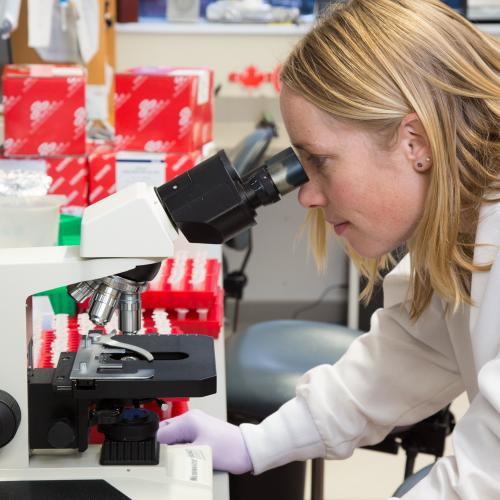Can experiences in infancy and childhood affect our health later in life? Are we born with our personalities or are they shaped by our earliest surroundings and social interactions? Do social and environmental conditions contribute to disease by turning genes “on” and “off”?
BC Children’s Hospital investigator Dr. Michael Kobor pursues fundamental questions like these as part of an emerging area of research called epigenetics. In 2016, Dr. Sarah Moore received a Scholars of Excellence Postdoctoral Fellowship to join Dr. Kobor’s team as a UBC postdoctoral fellow.
A recent study in Development and Psychopathology co-led by Dr. Moore and Dr. Kobor shows that the amount of physical contact babies receive early in life correlates with changes in marks upon the genome that might affect whether or not genes are expressed, potentially impacting health and development.
Dr. Moore talks about the findings of this study and how she’s working to understand how environmental exposures and social conditions at the beginning of life contribute to health and disease.
Your research is an area called “epigenetics.” What is epigenetics and why is it important?
The genetic code we inherit from our parents doesn’t change over the course of our lifetimes. However, environmental factors can influence whether genes are “turned on” or “turned off.” This is the key focus of epigenetics; it’s an area of study that looks at how modifications to DNA and the way it is packaged influence gene expression, and the biological and environmental factors that shape these modifications.
Epigenetics is a really exciting area of study because it could help us understand a whole host of human health conditions. While certain diseases have a clear genetic cause, many conditions are the result of a complex mix of genetic and environmental factors. Using epigenetics, we may develop new ways to diagnose, prevent and treat complex conditions, like autism and cancer.
How did you become interested in this area of research?
My background is in neuroscience and I’m really interested in the development of personality. I think most of us believe that our experiences shape who we are on some level and there is scientific evidence that this happens. For example, we know infants are born with certain temperaments and often assume this is because of their genetics. However, we also have evidence that things like heightened stress early in life may effect aspects of personality. I became interested in epigenetics because it’s a way to understand the biological processes through which our environments interact with our genes to affect who we are.
What did you discover in the study you recently co-authored about the effects of physical touch on infants?
In the study, parents of 94 healthy five-week old babies kept diaries detailing when the infants cried, fed, slept and fussed and how often the parents held them. When the children were four and half, our team took a DNA sample from each child by swabbing the inside of his or her cheek.
The researchers then analyzed the DNA to examine the degree of an epigenetic mark called methylation, a chemical tag on genes related to whether they’re “turned on” or “off.” Researchers found differences in methylation between babies who received a lot of physical contact and those who received less at five specific sites. Of these sites, one is within a gene that plays a role in the immune system and another is within a gene that plays a role in metabolism.
Previous research has shown that physical contact may affect the epigenome in rats; this the first study to show such long-term molecular consequences of physical touch in humans.


What does this mean for children?
This research suggests that early in life experiences do get under our skin, so to speak, and lead to changes on a molecular level. We need to do more work to determine if and how the differences in DNA methylation we observed actually impact health and development, but this is an important first step.
What should parents take away from these findings?
This study adds to a significant body of research showing soft touch and close contact between babies and caregivers reduces stress, promotes bonding and contributes to long-term healthy development. However, I do want parents to know that this research is still at an early stage. There are many factors that contribute child’s health and well-being, and physical contact early in life is just one of them.
We know most parents want what’s best for their children and a wide-range of outside circumstances can influence how much they hold their babies. This work has great potential for teaching us about child health and development; it shouldn’t make parents feel worried or guilty.
What have you liked most about working at BC Children’s Hospital?
I’ve really appreciated having a chance to see the clinical side of research. When I was in grad school, most of my research subjects were undergraduate students, and now, I’m learning how to engage in research with clinicians and patients in the hospital and families in the community. I feel like I am starting to do research that might actually translate into improvements in care for children and families.
You moved to Vancouver when you received a Scholars of Excellence Postdoctoral Fellowship. This program brings exceptional postdoctoral fellows to British Columbia to pursue innovative research under the mentorship of a BC Children’s investigator. What has been your favourite thing about living in BC?
I love climbing in Squamish. I’ve been climbing in gyms for a long time, and had just started to go outdoors the year before I moved here. When I got here, I was excited to discover there was amazing outdoor climbing just an hour away from the city.




